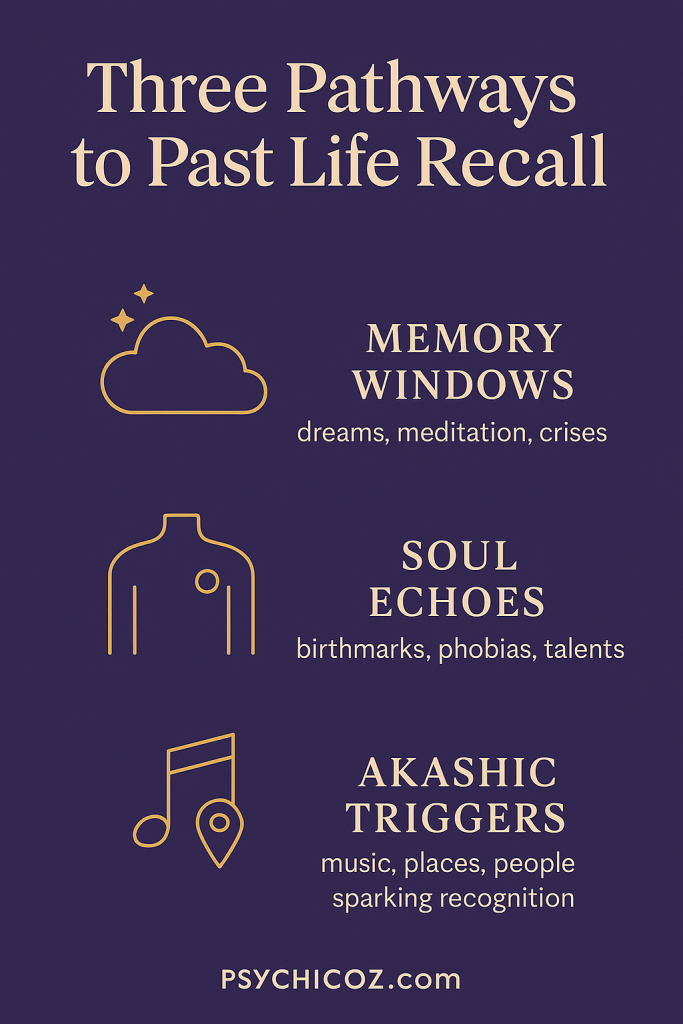For as long as people have looked up at the stars and wondered, “Where did I come from?”, the idea of past lives has stirred human imagination. Maybe you’ve felt it yourself—a strange pull toward a certain culture, an irrational fear that makes no sense in this life, or that eerie moment of déjà vu when you feel you’ve already lived through an event. For many, these experiences aren’t just coincidences. They are fragments, echoes, or even direct memories of past lives.
But why do only some people remember, while others don’t? Why do children sometimes spontaneously talk about a previous family or accident, while adults struggle to recall even a trace? And is there real evidence that past lives exist?
This article dives deeper than surface-level reincarnation chatter. We’ll explore spiritual insights, scientific studies, and real-life examples. You’ll learn new concepts—like memory windows, soul echoes, and Akashic triggers—that explain how past-life memories surface. And along the way, we’ll see why psychics encourage you to trust these experiences, not dismiss them.
What Are Past Life Memories Really?
At its simplest, a past-life memory is the experience of recalling events, people, or places from a lifetime before your current one. But these memories don’t always play like a Netflix rerun. They come in fragments: a recurring dream, a sudden knowledge of a skill you never studied, or a symbolic flash during meditation.
Spiritual traditions describe them as soul memories—imprints carried from one incarnation to another. Psychology might explain them as subconscious imagery surfacing. From a psychic’s perspective, both views overlap. The soul and the subconscious are intertwined, and both hold clues about who you’ve been before.
Research & Evidence: What Science Has Found
It’s tempting to dismiss past-life talk as pure mysticism. But science has documented compelling cases.
Children and Memories: At the University of Virginia’s Division of Perceptual Studies, researchers have collected over 2,500 cases of children, often between ages 2 and 5, who spontaneously describe past lives. They may name specific people, places, or events that are later verified. Some even display unusual behaviors or preferences tied to the claimed past life (UVA Perceptual Studies).
Systematic Reviews: A scoping review of 78 published observational studies examined cases worldwide where children and adults claimed past-life memories. Many included physical evidence, like birthmarks or defects matching wounds in alleged past lives (PubMed).
Case Reports: In a 2024 case study, a child described being their deceased granduncle, with details that matched family records. The child also had a birth defect in the same area where the relative had a fatal wound (PubMed).
Physical Correlations: Dr. Ian Stevenson’s decades of research documented birthmarks and deformities in children that corresponded to past-life injuries. Newer studies continue to analyze these findings, particularly in head and neck cases (PubMed).
While skeptics argue alternative explanations, the sheer volume of detailed cases suggests something deeper than imagination at play.
Why Most People Don’t Remember
If reincarnation is real, why don’t we all remember our past lives clearly?
Spiritual traditions suggest forgetting is intentional. If you carried every memory of every life, you’d be weighed down by trauma, guilt, and unfinished business. Forgetting allows a fresh start.
Still, some fragments break through:
Trauma Memories: Abrupt or violent deaths may leave strong impressions, surfacing as phobias. A fear of water might trace back to drowning.
Emotional Ties: Powerful love or rivalry can carry over, showing up as instant attraction or tension with someone you just met.
Cultural Suppression: In societies that dismiss reincarnation, people may ignore or suppress unusual memories.
New Ideas: Memory Windows, Soul Echoes & Akashic Triggers

To bring new life to the conversation, here are three fresh concepts psychics use to explain how past-life recall works:
Memory Windows: These are moments when the veil between lives thins. They often happen in dreams, during meditation, or in times of crisis. Suddenly, you “know” something without explanation.
Soul Echoes: These are physical or emotional signals carried into this life. Birthmarks, irrational fears, or lifelong fascinations with certain cultures may be echoes of past experiences.
Akashic Triggers: The Akashic Records are said to store every soul’s journey. Certain music, places, or even faces can trigger access to these records, evoking déjà vu or recognition.
Examples of Past Life Memory
Example 1: A young boy in India insisted he had been a shopkeeper in a nearby town. He named the shop, his former family, and even how he died. When researchers investigated, the details matched a man who had died years before the boy’s birth.
Example 2: Sarah, a 35-year-old teacher, had recurring nightmares of drowning. She also had a crescent-shaped birthmark on her chest. Through regression therapy, she recalled being a sailor who drowned at sea. After this, her fear of deep water eased.
Example 3: Michael, who had never left the U.S., spontaneously described streets, landmarks, and dialects of a small Italian town during a meditation retreat. Later, travelers confirmed his descriptions were accurate—even though he’d never studied Italian.
These stories show how past-life memory can surface through children, physical echoes, or spontaneous visions.
Safely Exploring Past Life Memories
Curiosity about past lives is natural, but safety matters. Diving too deeply without guidance can confuse imagination with memory. Here’s how to explore responsibly:
Meditation: Relax the mind and ask for gentle insights.
Dream Journaling: Keep a notebook by your bed. Dreams often carry fragments of past lives.
Regression Therapy: If you try hypnosis, work with a certified practitioner who understands ethical guidelines.
Grounding: Always finish sessions with grounding practices—like visualizing roots in the earth or touching something solid.
The UVA research center itself warns against reckless hypnotic regression, as suggestion can plant false memories. Approach with respect, not desperation.
Integrating Past Life Insights into Present Life
Remembering a past life isn’t about nostalgia. It’s about growth.
Healing Phobias: Recognizing a drowning memory can ease a water fear.
Understanding Relationships: If you and your sibling have constant friction, maybe you clashed in a past life. Awareness can heal.
Breaking Patterns: If you’ve been poor in multiple lives, you might finally be ready to learn abundance lessons.
By integrating insights, you transform them from curiosities into tools for healing.
Skepticism, Misconceptions, and Belief
Skeptics often argue that past-life memories are just false memories, fantasies, or products of cultural storytelling. It’s true that memory is fallible. But does fallibility explain cases where children provide names, locations, and death circumstances later confirmed by records?
Another misconception is that remembering past lives will make you reject your current one. In truth, remembering often makes people cherish the present more. They see this life as part of a bigger, meaningful journey.
Why Believing in Past Lives Can Empower You
Belief in past lives isn’t about escapism. It’s about empowerment.
Empathy: If you’ve lived in many roles, you’re less likely to judge others.
Self-Acceptance: Your struggles aren’t random—they may be part of a soul lesson carried across lifetimes.
Purpose: Believing you’ve been here before strengthens your sense of direction.
Psychics emphasize that whether you remember vividly or not, your soul carries wisdom forward. Trusting that wisdom makes you more resilient, compassionate, and whole.
Conclusion: Remembering as a Gift, Not a Burden
The urge to remember past lives is really the soul longing for continuity. You are not just the product of your family and upbringing—you are a traveler across lifetimes, gathering experiences. Whether you recall a clear past life or just sense its echoes, those memories serve one purpose: to help you grow now.
So if a song, a dream, or a déjà vu stirs something ancient within you, don’t brush it aside. Pause, listen, and honor it. It might just be your soul whispering, “You’ve been here before—and you’re here to keep evolving.”
FAQ: Want to Remember Past Life?
What is a past life memory?
A past life memory is a spontaneous or intentional recall of experiences, places, or identities perceived to be from a previous incarnation.How do I know if a memory is from a past life or imagination?
Past life memories feel crisp, emotionally charged, and often arrive unbidden; imagination usually feels effortful and controllable.What are common signs of past life memories?
Recurring dreams, persistent déjà vu, irrational phobias, strong cultural affinities, and birthmarks linked to specific narratives.Why do children remember past lives more easily?
Ages 2–5 tend to be less filtered and more spontaneous; many cases report verifiable details before social conditioning sets in.What are memory windows?
They are moments when recall is easier—during dreams, meditation, liminal states, travel to a familiar-feeling place, or emotional peaks.What are soul echoes?
Physical or emotional imprints—such as birthmarks, talents, or fears—that appear to carry over from prior lifetimes.What are Akashic triggers?
People, places, music, or objects that spontaneously evoke vivid recognition, as if accessing your soul’s “record.”Can meditation help me remember past lives?
Yes. Calm focus lowers mental noise, allowing symbolic scenes, names, or time-period impressions to surface.Is hypnosis or regression therapy safe?
When practiced by trained, ethical professionals, it can be helpful; avoid suggestive or unqualified facilitators.How do I start remembering past lives at home?
Keep a bedside dream journal, meditate with a clear intention, and review patterns across multiple entries.Can past life memories heal present-day phobias?
They can. Recognizing the origin of a fear (e.g., drowning) often reduces its intensity and supports therapeutic work.Are past life memories always literal?
Not always. Some are symbolic composites; track outcomes and corroborate details before drawing firm conclusions.What role do birthmarks play?
Some case studies link birthmarks to wounds or marks from an alleged previous life; treat such clues as leads, not proof.Can relationships reflect past life ties?
Yes. Instant affinity or friction can indicate unresolved lessons or strong bonds carried across lifetimes.How can I avoid false memories?
Use neutral prompts, avoid leading questions, document first impressions, and seek external verification where possible.Do different cultures view past lives differently?
Yes. Beliefs vary widely, but cross-cultural case reports exist; keep an open, respectful lens while evaluating claims.What questions should I ask before regression?
Ask for practitioner credentials, consent process, recording policy, aftercare steps, and how they minimize suggestion.How often should I attempt recall?
Less is more. Short, consistent sessions (10–15 minutes) with rest days are better than marathon attempts.What if nothing comes up?
That’s normal. Focus on patience, nervous system regulation, and curiosity. Forcing recall can muddy results.Can diet or lifestyle affect recall?
Good sleep, hydration, gentle movement, and reduced stimulants may improve clarity and dream recall.What if a memory is disturbing?
Pause. Ground yourself, journal, and consider a trauma-informed therapist or skilled regression professional.Can past life skills carry over?
Some people report innate talents (languages, music, crafts) that emerge with little training; track and test them.How do I verify a past life memory?
Research names, maps, period details, clothing, tools, or dialects; seek third-party records when possible.What role do psychics play in recall?
Ethical psychics can help interpret symbols, timelines, and themes, and offer structure for safe exploration.Can technology help?
Voice notes, dream apps, and timelines help you tag dates, themes, and later confirmations for pattern analysis.How do I integrate what I learn?
Translate insights into present-day actions: therapy, boundary-setting, career shifts, or relationship healing.Will remembering past lives distract me from this life?
Healthy recall strengthens purpose in this life, deepens empathy, and reduces existential fear.How do I talk about this with skeptics?
Share calmly, stick to your data, and avoid trying to convince; your goal is clarity, not debate.Can I explore past lives without regression?
Yes. Use dreamwork, active imagination, automatic writing, and mindful exposure to Akashic triggers like travel or music.What’s the best mindset for past life exploration?
Curious, grounded, and non-attached. Let evidence accumulate; let meaning unfold over time.





I find it fascinating that the article links energy transformation to the concept of past lives. The visualization techniques described appear to be a blend of mindfulness and imaginative elements.
Interesting perspective on past life regression. I can see how meditation might help with exploring such concepts. The idea of using visualization techniques is quite thought-provoking.
The concept of past life regression is fascinating. The idea that our energy evolves and could provide insights through meditation is truly captivating. I’ve always thought there was more beyond our immediate consciousness, and this method seems like a peaceful approach to self-discovery.
Absolutely, Kim! Meditation is such a powerful tool for introspection and understanding. I find that even if one is skeptical about past lives, the process itself can bring immense peace and self-awareness.
The method described seems to provide a guided meditative practice that could be beneficial for general mindfulness, even for those who might be skeptical of past life regression. It’s an interesting way to engage the mind.
The article presents a structured approach to past life regression through meditation. While it is intriguing, I wonder about the scientific evidence supporting these experiences. More research could be beneficial.
For those interested in delving deeper into past life regression, it’s worth noting that many psychologists regard it as a pseudoscience. However, the practice of meditation and visualization can still be valuable for stress relief and mental clarity, regardless of what one believes about past lives.
Well, this is just what I need. Another excuse to sit on my behind and do absolutely nothing while calling it ‘exploring past lives’. Maybe I can discover I was Napoleon and explain my short-tempered nature!
Oh, wonderful! So now I can pretend to be Cleopatra in my past life while I meditate. Sure, why not? Next thing you’ll tell me is I can meet my pet dinosaur too.
While I’m not entirely convinced about past life regression, the meditation techniques mentioned could serve as a useful tool for self-reflection and stress relief. The idea of journaling thoughts post-meditation is also compelling.
I find the entire notion of past life regression to be scientifically implausible and quite frankly a bit absurd. There’s no empirical evidence to support it, and it seems like a romanticized idea rather than a factual one.
Comments are closed.